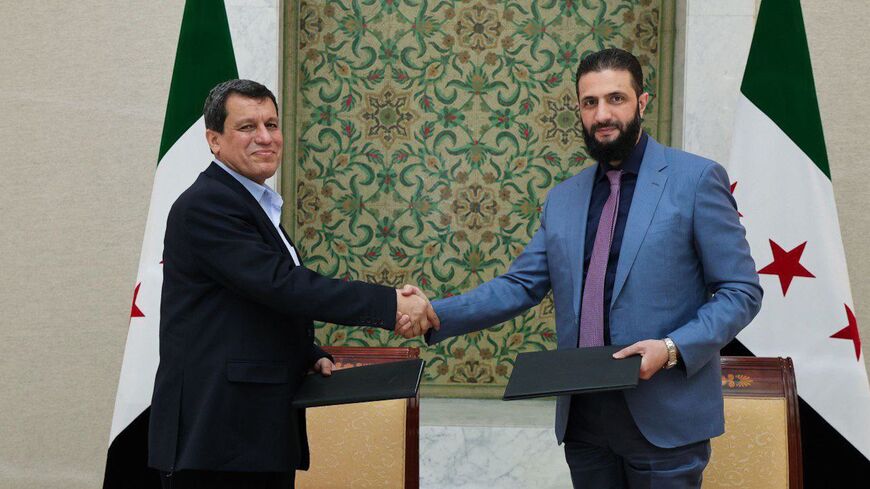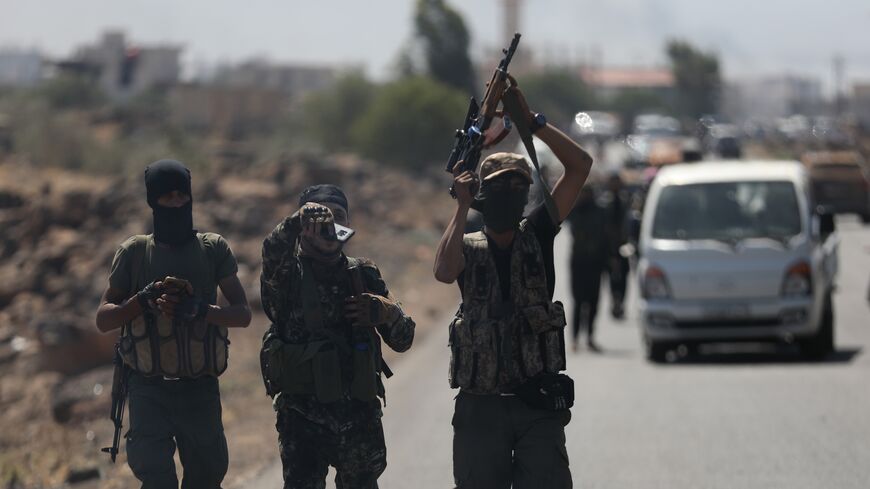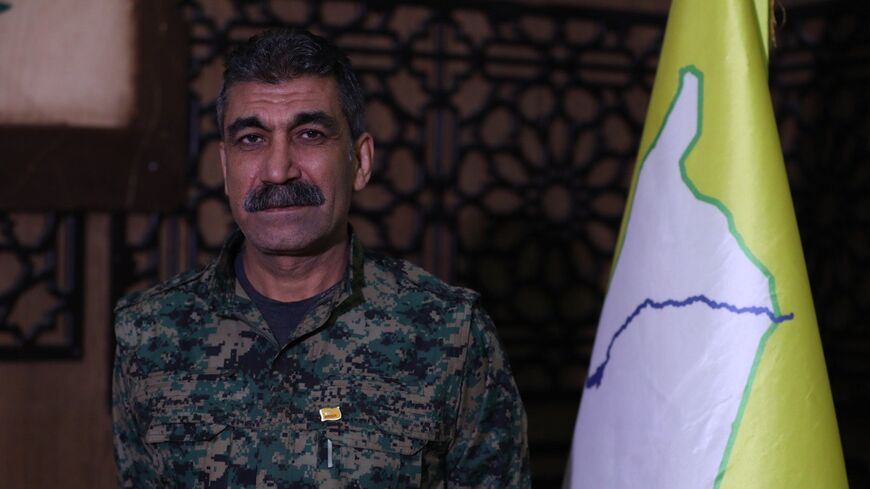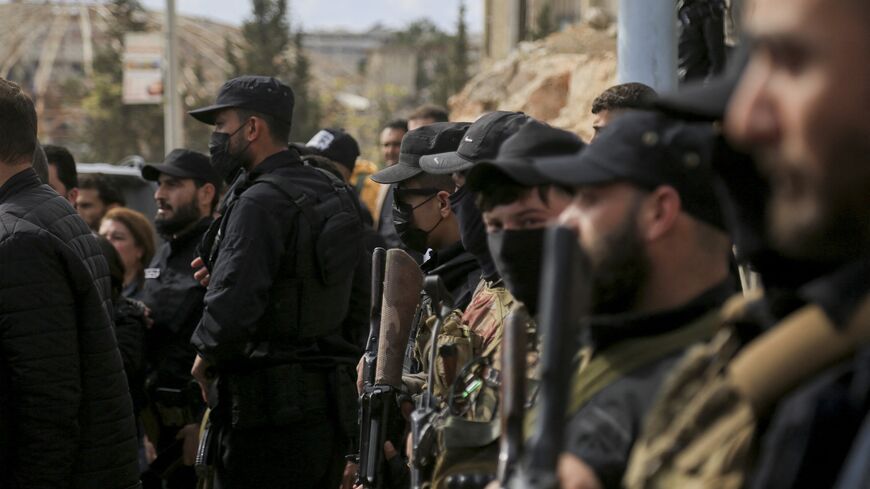Syria’s Shibani says no concrete progress in integration talks with Kurds
Syria’s foreign minister cites a “positive trajectory,” but Damascus and Kurdish officials remain deadlocked despite US-brokered efforts to unify the country’s political and military structures.
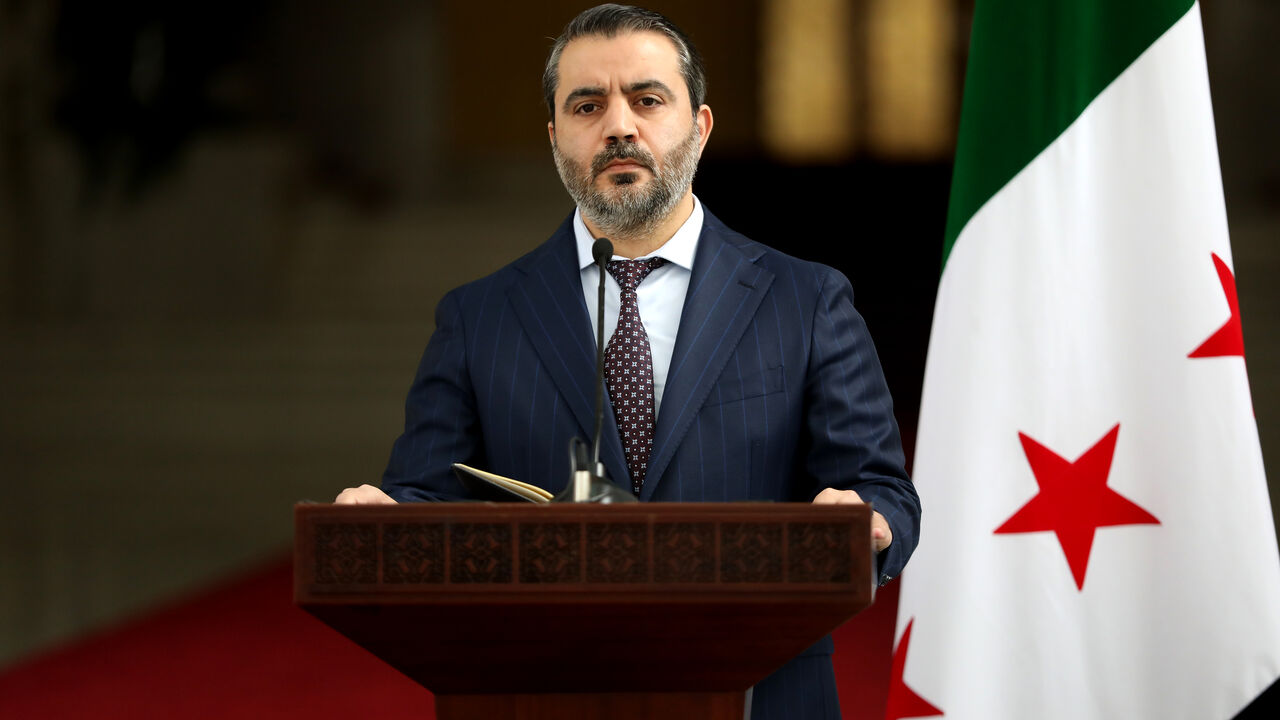
MANAMA – Syria’s Foreign Minister Asaad al-Shibani said on Sunday that no substantive progress had been achieved between his government and Kurdish officials in talks aimed at reintegrating the Kurdish-led autonomous administration and its military structures with Damascus.
“The discussions with the SDF [Syrian Democratic Forces] are continuing. There are no positive or practical steps [taken so far],” Shibani told Al-Monitor on the sidelines of the Manama Dialogue Conference in Bahrain. “In general, the trajectory is positive,” Shibani added.
Shibani’s comments stood in stark contrast with US Syria envoy Tom Barrack’s assessment of the talks that are being brokered by the United States. In an address to the conference organized by the International Institute for Strategic Studies a day earlier, Barrack said the talks were going “amazingly well.”
Shibani’s remarks come ahead of a landmark meeting between Syria’s interim president, Ahmad al-Sharaa, and President Donald Trump in Washington that is tentatively scheduled to take place on Nov. 10. Sharaa, who toppled Syria’s long-time dictator Bashar al-Assad in December, will be the first Syrian leader to be received at the White House since Syria gained independence in 1946.
Barrack said the two presidents would “hopefully” be signing an accord for Syria to formally join the US-led global coalition against the Islamic State. Shibani called the visit “historic” in his public remarks at the conference.
Sharaa will be traveling to Washington from Brazil, as first reported by Al-Majalla, where he will attend the 30th COP climate summit that is due to be held on Nov. 6-7.
The SDF remains the US-led coalition’s top partner on the ground in Syria and played a decisive role in the jihadis’ territorial defeat in 2019. However, ISIS remnants continue to pose a threat, US and Syrian officials say, mounting systematic if small attacks against Kurdish and Syrian forces across the country.
A deal between the Kurds, who control a third of the country, including most of its oil and water resources, is seen as essential to the recovery of Syria’s war-shattered economy. It would also help the Trump administration, which is lobbying Congress — where bipartisan sympathy for the Kurds is strong — for a full repeal of remaining sanctions over Syria, to bolster its case.
On March 10, under pressure from the United States, Sharaa and the SDF commander-in-chief, Mazlum Kobane, signed an 8-point framework agreement for the integration of Kurdish-led civilian and military structures with the central government. However, despite US mediation efforts, tensions between the sides remain high, with sporadic clashes around the Tishreen dam and more recently in Aleppo, where the Kurds control two neighborhoods, Sheikh Maqsoud and Ashrafiyeh.
The Americans brought Kobane and Sharaa together for a fourth time on Oct. 7 in the wake of another alarming flare between Kurdish and government-linked forces in Aleppo. A ceasefire has been largely holding since then and Barrack asserted that efforts for the SDF to merge with the national army were progressing well. “We have been having a great onboarding with Mazlum and Sharaa,” the envoy, who is also the US ambassador to Turkey, told reporters on Saturday. Issues of revenue and oil sharing, “it’s all moving,” said the animated 78-year-old, sporting a coral red silk tie and alligator skin shoes.
In truth, fundamental differences remain.
Sipan Hemo, the SDF commander who is leading the talks with military officials in Damascus, let on in a recent interview with Kurdish media that things were not going quite as Barrack described. “During the last meeting in Damascus, a positive atmosphere prevailed with our participation, along with that of the Ministry of Defense and several US officials. However, no tangible results were achieved, and the outcomes were limited to verbal promises and general statements of intent without clear, written agreements,” Hemo said.
The Kurds do not want to relinquish control over the SDF and their weapons and, while they accept in principle to submit to the overall command of the national army, they want to adhere as distinct units and to remain in the current positions. They also want to retain administrative autonomy. “Integration must be based on mutual respect and partnership — not on the vision of some parties in Damascus, who base their plans on exclusion and liquidation,” Hemo said.
Barrack, a billionaire real estate investor with Lebanese Christian roots and close ties with Trump, became Syria envoy in May and sparked controversy with his strident rejection of any federal arrangement for the Kurds, a position that mirrored Sharaa’s own uncompromising stance on decentralization. The envoy’s tone shifted after the wave of the ethnic bloodshed in Syria’s southern province of Suwayda in July, when Bedouin tribes and government forces were accused of killing large numbers of Druze civilians. He suggested that Sharaa’s views had softened too.
Barrack said on Saturday that in the debate over centralism versus federalism, “there has to be a hybrid,” so that “centralization can exist with local governance, schools, language, municipal authorities” as well as police forces. “That has to exist,” he said, arguing that this formula would resemble the Ottoman’s “millet” system that gave the empire’s minorities relative autonomy as long as they pledged absolute fealty and paid higher taxes than its Muslim subjects. “The reason that the Ottoman Empire worked for 550 years is because that is what they did.”
Barrack continued, “Let every culture stay its own culture. But give them some benefit on top so it’s like a cappuccino. The espresso is the culture. The foam is the juice. Right now, there’s no juice. So, what does anybody get from centralization?” he asked, in an apparent allusion to Syria’s collapsed economy.
Getting the economy off the ground, hence securing a full repeal of sanctions, should be the priority for all sides. “And I think what you see is the Sharaa government leaning [towards this approach], and seeing that that has to happen,” Barrack noted.
In other words, it is best to sign a deal as soon as possible, project unity to the outside world, notably to Congress, and figure out the details later. Such thinking reflects the signature approach of the Trump administration when pushing for peace elsewhere in the Middle East. It appears to have worked in the South Caucasus where Trump is credited with shielding Armenia from further aggression by Azerbaijan when he got both countries’ leaders to come to Washington and initial a peace protocol on Aug. 8 after decades of deadly conflict.
However, securing a deal between the Kurds and Damascus won’t be as easy. The Kurds have a large, US trained army and, having witnessed the mass slaughter of Alawites in March followed by similar carnage in Suwayda, are filled with distrust. More critically perhaps, Turkey is in the mix.
Ankara claims that the SDF is an existential threat because of its ties to another Kurdish militia, the PKK, that has fought the Turkish army for 40 years. In February, the PKK agreed to imprisoned leader Abdullah Ocalan’s demands that they disarm and disband and has taken some small steps in that direction. However, Turkey wants Ocalan to get the SDF, which also reveres him, to do the same. Complicating matters even further, those demands are bound up with Turkish President Recep Tayyip Erdogan’s efforts to remain in power beyond his mandated maximum two terms in office. The support of Turkey’s largest pro-Kurdish and second largest opposition party that is similarly in thrall of Ocalan is key.
Barrack maintained that Turkey did not pose an obstacle to the integration talks. Turkey “has been patient” and “they are loving the fact that it’s happening because then the SDF is aligned and is part of the regime,” Barrack concluded.

